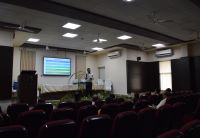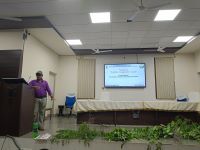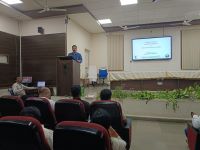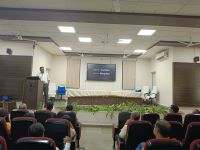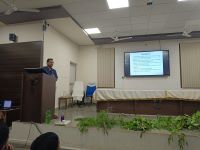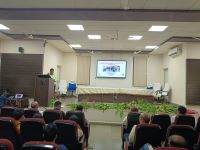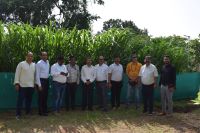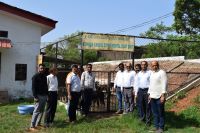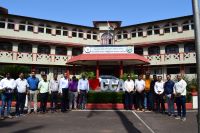
Scientific Management of Goats organized by ICAR-KVK, CCARI, Goa and Bihar Kosi Basin Development Project
Scientific Management of Goats organized by ICAR-KVK, CCARI, Goa and Bihar Kosi Basin Development Project
ICAR-CCARI, KVK, North Goa organized a Scientific Management of Goats training in collaboration with the Bihar Kosi Basin Development Project on 30 May 2024. Twelve officials from the Bihar State Government attended the training. Dr Parveen Kumar, Director, ICAR-CCARI, Goa, inaugurated the programme and encouraged veterinary officials to incorporate livestock components with crops, which will enhance the resilience of the farmer's farming system. Livestock plays a crucial role in the farming system as it ensures a steady source of income and nutritional stability for households. Additionally, it helps to reduce rural poverty by providing a reliable income stream even in unpredictable climatic conditions. Dr N. Bommayasamy, Senior Scientist & Head, KVK, shared that the farming community feeds goats with locally available fodder resources. They also use additional high-quality feeds and crop residues to meet their feed and fodder needs, however, these resources are gradually decreasing over time. He recommended cultivating fodder as an intercrop with grass and perennial leguminous fodder to fulfil the requirements and provide a well-balanced diet for the goats. Dr Udharwar Sanjaykumar Vithalrao, an expert in Animal Science, delivered demonstrations on the efficient management of goat housing and feeding. Dr. R. Solomon Rajkumar, Senior Scientist (Livestock Product Technology), provided insights on the processing of goat meat and milk products and the potential for marketing these products. Dr Susitha Rajkumar, Senior Scientist (Veterinary Pathology), emphasized the importance of adhering to proper vaccination and deworming protocols to prevent the occurrence of significant diseases in goats. Dr Shirish Narnaware, Senior Scientist (Veterinary Pathology), explained important viral and bacterial diseases in goats and their respective diagnostic methods. Dr Amiya Ranjan Sahu, Scientist (Animal Genetics & Breeding), emphasizes the importance of using high-quality breeding bucks to enhance the quality of breeds. He also recommends replacing the breeding buck every two years. Dr Gokuldas, P. P., Senior Scientist (Animal Reproduction), delivered lectures on the potential and methodology of artificial insemination in goats, utilizing frozen and liquid semen. Dr Uthappa A.R., Scientist (Agroforestry), delivered lectures on cultivating grasses and fodder trees suitable for feeding goats. Dr Udharwar Sanjaykumar Vithalrao showcased various techniques, including castration in young male animals, microchip implementation, concentrated animal feed production, and fodder cultivation. Dr. Udharwar Sanjaykumar Vithalrao, Dr. N. Bommayasamy, and Dr. Susitha Rajkumar coordinated the programme.
